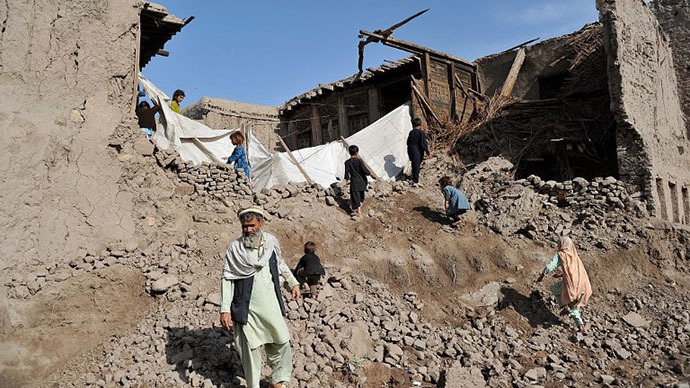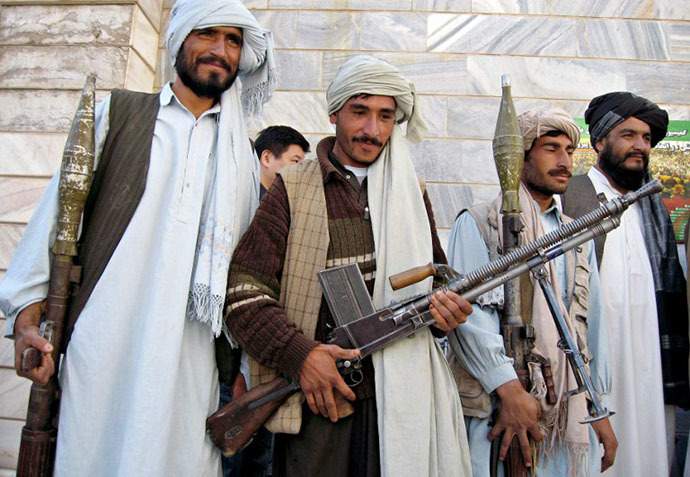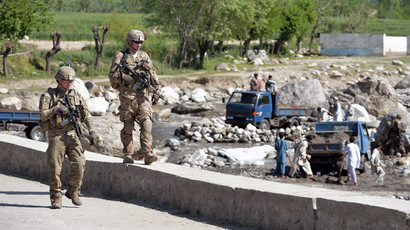Aiding the enemy? ‘US won’t stop paying Afghan contractors with militant links’

The US Army won’t bar Afghan contractors aiding militants from receiving contracts for reconstructing the country, a watchdog said in a report detailing the waste of resources plaguing the effort. The military say the evidence is not conclusive.
John Sopko, the Special Inspector General for Afghan Reconstruction (SIGAR), voiced his concerns over the military’s reluctance over the issue in Monday’s quarterly report. He said the US Army would not bar 43 individuals and companies from receiving contracts "despite detailed supporting information demonstrating that these individuals and entities are providing material support to the insurgency in Afghanistan."
"I am deeply troubled that the US military can pursue, attack and even kill terrorists and their supporters, but that some in the US government believe we cannot prevent these same people from receiving a government contract," Sopko wrote.
"In other words, they may be enemies of the United States, but that is not enough to keep them from getting government contracts," the report said.
The Army said SIGAR evidence were partially based on anonymous sources and was not sufficient to bar the contractors.
"The Army Procurement Fraud Branch did receive and review the 43 recommendations late last year, but the report did not include enough supporting evidence to initiate suspension and debarment under Federal Acquisition Regulations," said Matthew Bourke, an Army spokesman.

SIGAR did not identify the contractors in the report, but said that more than 80 of them were Afghan entities and the rest were based elsewhere in the region.
The watchdog raised the issue in its April report, warning that millions of US taxpayer money poured into Afghanistan are at risk of ending up in the hands of militants. In over a decade’s time, the US spent almost $100 billion in aid to the Afghan government, with most of the money going to the training of Afghan security forces.
In the latest report Sopko also lashed out at the misallocation
of funds revealed during the audit.
He criticized the US Agency for International Development (USAID) over its "Stability in Key Areas Program", which is aimed at strengthening local governments in Afghanistan.
"It's troubling that after 16 months, this program has not issued its first community grant," Sopko said adding that under the program almost $50 million, or roughly a quarter of its budget, have been spent on conferences, overhead and workshops.
USAID objected to SIGAR's findings in a letter. It suggested that the inspector general misunderstood the program's purpose and also noted that it had made significant progress as of July 1 in delivering grants.
The organization said it was slow on progress with the program due to delays in finalizing agreements with key partners in the Afghan government over how the projects would be carried out.
The delays have led to dissatisfaction and anger in the communities, according to SIGAR report. “Such disappointment may actually result in further destabilization and disaffection toward the Afghan government,” it said.
Sopko, who has held his position as inspector general for over a year, is among skeptics of US aid to Afghanistan. He has criticized the reconstruction programs over red tape and vulnerability to corruption plaguing the Afghan government.
The US is wrapping up its Afghan campaign this year. After the planned pullout of troops is completed by 2014, only a limited military contingent not directly engaged in combat is expected to stay. Afghan security forces are then to completely take over responsibility for security in the insurgency-ravaged country.














